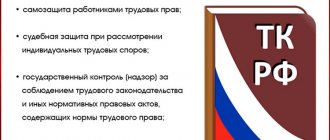Article 31 of the Labor Code of the RSFSR dismissal
Some of the stages of the dismissal procedure at the employee’s initiative are typical for all methods of dismissal, while the other part is special specifically for voluntary dismissal.
This stage of compliance with the voluntary dismissal procedure is important to mention for one reason.
Dismissal at will will be legal only if the employee really wants to end his employment relationship with the employer.
On January 1, 2009, changes were made to the law “On Employment in the Russian Federation”** and the list of reasons for dismissal, which provided some advantages in payments to the unemployed, disappeared from Article 29. Today there is only one list of valid reasons for dismissal, given in the explanation of the State Committee for Labor of the USSR and the Secretariat of the All-Union Central Council of Trade Unions dated July 9, 1980.
The employee has an entry in his work book “dismissed at his own request, Article 31 of the Labor Code of the Russian Federation from June 30, 2000.” Which day in this case is the last day of work under the Labor Code, June 29, 2000 or June 30, 2000?
The recording was made incorrectly.
https://youtu.be/TxX71SD6Dhg
Dismissal at the initiative of the employer under the Labor Code
The Labor Code of 2002 moved the article on termination of labor relations with an employee at the initiative of the employer to number 81.
It was this number that replaced Art. 33. Article 133 of the Labor Code of the Russian Federation and Article 331 also have no analogies with the old version numbered 33. Art. 133 regulates the minimum wage, and Article 331 concerns teaching activities and the right to carry them out.
In order to dismiss a person from an organization, the employer will have to resort to the argumentation from Article 81. True, this clause of the code does not have such an unambiguous negative connotation as before. It lists possible reasons for parting with an employee and some of them are more unforeseen than intentional.
So, let’s figure out what reasons a modern employer has for dismissing one or more employees. The points in this section include the following reasons for notifying the dismissed person of the decision:
- Liquidation of a legal entity applies to both organizations and individual entrepreneurs.
- Staff reduction.
- Inconsistency with the occupied workplace identified during certification.
- There has been a transfer of property from one hand to another and the new management does not want to continue cooperation with some specialists. This point applies only to management personnel.
- If there are previous disciplinary sanctions, you can dismiss an employee if he intentionally fails to fulfill his duties.
- Gross violations of labor discipline, such as absenteeism, being drunk at work, disclosure of information that is classified as secret, theft of property, embezzlement, violation of safety regulations, which entailed serious consequences in the form of injuries, accidents, etc.
- In case of loss of trust in an employee as a result of guilty acts and actions committed by him.
- When employees of the teaching and educational sphere are found to be immoral.
- A person from the management team may be dismissed if he makes a decision that entails serious damage to the organization.
- If facts are discovered indicating that the employee knowingly provided false information or forged documents when applying for a job.
This list shows all the possible reasons why an employer may resort to exercising its legal right to terminate an employment contract with an objectionable employee.
Labor Code of the Russian Federation 31 articles
According to the rules of the Russian language, the last day of work is June 29, 2000, because the employee was fired from June 30, 2000. At the same time, when an employee is dismissed, column 2 of the work book indicates the date of dismissal (last day of work). Therefore, the last day of work (date of dismissal) should be considered June 30, 2000.
This is important to know: Who has advantages when reducing staff?
To clarify the date of dismissal, we suggest requesting from the previous employer (if possible) a dismissal order, which is indicated in the work book, on the basis of which the entry was made in the work book.
Labor Code by agreement between the employee
and the administration, the employment agreement (contract) can be terminated even before the expiration
https://youtu.be/yomITwRihgg
notice period for dismissal, then the dismissal of the employee by agreement
may be immediate.
§4. An employee who has submitted a notice of resignation has the right to
warnings to withdraw your application, and then dismissal is not carried out,
except for one case when he was already invited to take his place from another production
an employee who, according to Part.
IV Art. 18 Labor Code cannot refuse admission to
§5. If the employee leaves work before the expiration of the notice period and
without an order to dismiss him early, then the administration can qualify
it’s like absenteeism without good reason and fire him for absenteeism (see.
Step-by-step instruction
Termination of an employment relationship at the request of the employee usually causes the least difficulties. As a rule, the parties to the contract come to an agreement and there are no conflicts between them.
However, unscrupulous employers often force employees to write letters of resignation, thereby substituting the real grounds for dismissal. In this case, the interests of the employee may suffer, and such dismissal is considered illegal. Then the court reinstates the dismissed citizen.
The step-by-step dismissal procedure is as follows:
employee submitting an application for upcoming dismissal
You need to pay attention to the end date of work indicated in the document. It is necessary to formulate this way: “I ask you to fire me on August 1”, but not “from August 1”
The date of dismissal will be the final day of work in the organization; the period between filing an application and dismissal. Typically, the law requires a two-week period; for management it is equal to a month. But if both parties do not object, this period can be reduced. The employer does not have the right to change it downward independently; issuing an order to dismiss a citizen. The order is issued on the employee’s final day of work and is presented to him for review. If the citizen so desires, he is given a copy of the order; issuing to the employee a certificate of the salary received over the last 2 years. The document is handed over to the employee on the day of his dismissal or, if this is not possible, within 3 days after his relevant application; generation of a certificate or other document with information for the Pension Fund. The law does not stipulate the exact form of the document, but the forms specified by the Pension Fund of the Russian Federation must be used; a record of the dismissal in the employee’s personal card; generation of a settlement note in relation to an employee. The document contains information about the employee, information about the period of his work and data on accruals and payments upon dismissal; full payment. All amounts must be paid to the dismissed employee on the day of termination of work. If the citizen was not at work that day, the money is issued on the day immediately following the receipt of such a request from him; entry in the work book. After entering the information, the book is issued to its owner; return to the citizen copies of the documents that he submitted when applying for a position.
Watch the video. Dismissal at will without work:
Perform on behalf of the organization actions to implement its rights and obligations arising from civil, labor, tax and other legal relations (act without a power of attorney): in the scope of the owner’s powers to own, use and dispose of the organization’s property; in the field of rights of the copyright holder of exclusive rights to the results of intellectual activity and means of individualization equivalent to them; in the area of the rights and obligations of the employer in labor relations with other employees of the organization, etc.
Alexey, good afternoon! Legally, there is no such term as “dismissal under article”.
Article 31 of the Labor Code of the RSFSR dismissal
Only the clearly expressed desire of the employee who has entered into an employment contract
for an indefinite period, is the basis for his dismissal on his own
desire. At the same time, Art. 31 of the Labor Code provides for two notice periods.
the employee’s application may not contain indications of a specific period and motives
dismissals. Then a two-week period applies from the date of submission of the application.
An employee can also submit an application during vacation or a business trip.
If in the application the employee indicates valid reasons for dismissal,
due to which he cannot continue to work and simultaneously submits the corresponding
evidence, then the employment contract is terminated within the period requested
Basic provisions
In the modern version of Art. 33 has been moved to the social partnership section. It includes explanations of who can be the employer's representative. Therefore, it does not apply to dismissal.
The text contains two parts . The first states that negotiations with an employee can be conducted by the manager, the owner of the individual entrepreneur or any authorized person. Sometimes such interaction is required to change the text of the contract. In government agencies, this role is played by the relevant body.
If collective disputes arise related to changes in labor agreements, the interests of the employer are represented by the relevant association (it can be of different levels from territorial to all-Russian). This is also relevant when participating in commissions that regulate social and labor relations.
You cannot fire a person without appropriate reasons. But in modern editions the article has long had a different meaning.
Article 31 of the Labor Code of the RSFSR, dismissal when canceled
Federation and the Supreme Council of the Russian Federation, 1992, N 41, art.
Upon expiration of the notice period for dismissal, the employee has the right to terminate
work, and the administration of the enterprise, institution, organization is obliged to issue
employee’s work book and make payments to him.
By agreement between the employee and the administration, an employment contract
(contract) can be terminated before the expiration of the notice period for dismissal
(as amended by the Decree of the Presidium of the Supreme Soviet of the RSFSR dated February 5, 1988 - Vedomosti
Supreme Council of the RSFSR, 1988, N 6 art. 168); (as amended by the Law of the Russian Federation
dated September 25, 1992
Meaning of Art. 33 Labor Code
In the Labor Code of the Russian Federation (LLC), approved by the Supreme Court of the RSFSR on December 9, 1971 (or the old Labor Code), art. 33 played a fairly important role, because it contained a list of grounds giving the organization’s administration the right to initiate, on its own initiative, the termination of an employment contract with an employee. Most often, dismissal under Article 33 of the Labor Code meant that the employee was fired due to absenteeism or systematic disciplinary violations. This, accordingly, had a negative semantic connotation for him and subsequently served as an obstacle to normal employment.
Although the list of grounds contained in Article 33 of the old Labor Code of the Russian Federation was in fact broader and did not always imply the presence of a violation of discipline. For example, this also included layoffs due to the liquidation of an organization or due to a reduction in the number of employees.
Article 31 of the Labor Code of the RSFSR, dismissal for caring for a child under 14 years of age
At the same time, when an employee is dismissed, column 2 of the work book indicates the date of dismissal (last day of work). Therefore, the last day of work (date of dismissal) should be considered June 30, 2000.
To clarify the date of dismissal, we suggest requesting from the previous employer (if possible) a dismissal order, which is indicated in the work book, on the basis of which the entry was made in the work book.
3 tbsp. 84.1 of the Labor Code of the Russian Federation, the day of termination of the employment contract in all cases is the last day of work of the employee, with the exception of cases where the employee did not actually work, but in accordance with the Labor Code of the Russian Federation or other federal law, he retained his place of work (position).
In accordance with clause 5.1 of the Instructions for filling out work books (approved.
Article 33 of the Labor Code of the Russian Federation upon dismissal
Law of the Russian Federation of September 25, 1992 N 3543-1) 4) absenteeism (including absence from work for more than three hours during a working day) without good reason; 5) absence from work for more than four months in a row due to temporary disability, not counting maternity leave, unless the law establishes a longer period for maintaining a job (position) in case of a certain illness. For employees who have lost their ability to work due to a work injury or occupational disease, their place of work (position) is retained until their ability to work is restored or disability is established; (edited)
Article 31 of the Labor Code of the Russian Federation dismissal
Commentary on Article 31 of the Labor Code of the Russian Federation
§1. For employees who have entered into a fixed-term contract, Art. 31 Labor Code does not apply
since they for the duration of the contract prohibited themselves from resigning on their own
desire. But when they have valid reasons for dismissal, then it applies
32 of the Labor Code (see Art. 32 of the Labor Code and commentary thereto). Other employees at any time
time can submit a letter of resignation of their own free will.
Persons sentenced to correctional labor without imprisonment during the term
their service cannot be dismissed at will without permission
this is the responsibility of the authorities responsible for the execution of this type of punishment (see Article 94 of the ITC
§2. Only the clearly expressed desire of the employee who has entered into an employment contract
for an indefinite period, is the basis for his dismissal on his own
Analogue of Art. 33 Labor Code in the Labor Code of the Russian Federation
Contents similar to Art. 33 of the Labor Code, in the new law acquired Art. 81 of the Labor Code of the Russian Federation, which reflected a clarified and expanded (in comparison with the Labor Code) list of grounds for dismissal related to the employer’s initiative.
Free legal consultation We will answer your question in 5 minutes!
Ask a Question
Free legal consultation
We will answer your question in 5 minutes!
Ask a Question
Changes in content were reflected not only in a significant increase in the number of reasons for dismissal (13 versus the previous 8), but also in the expansion of the text of explanations for them. At the same time, 2 main provisions present in Art. 33 of the Labor Code, transferred to Art. 81 Labor Code of the Russian Federation:
- In some situations, the employer is required to try to employ the employee before dismissing him;
- Dismissal caused by the initiative of the employer is prohibited while the employee is on sick leave or on vacation.
Article 31 of the Labor Code of the Russian Federation: dismissal for caring for a child under 8 years old
What are my next steps?
PF doesn’t care what link the article is to, the main thing is that there are deductions, am I wrong?
That one-day organization was sold to Vasya, a homeless person, you understand the consequences.
I send the employee to an organization that will have to provide a certificate
Your task is to make YOUR own entries correctly, and not try to correct someone else’s.
I worry when the entries in TC are incorrect
The opinion of the forum administration may not coincide with the opinion of the forum participants. The forum administration is not responsible for messages posted by forum participants.
At the same time, we kindly ask participants not to violate the current legislation when communicating: when quoting someone’s works, do not violate the rights of authors, do not disseminate false information that defames anyone, do not disclose anyone’s personal data, etc.
General points of the old art. 33 Labor Code and new art. 81 Labor Code of the Russian Federation
In the new art. 81 of the Labor Code of the Russian Federation preserves the reasons for dismissal caused by:
- Liquidation (termination of activities) of the employer or reduction of its staff. At the same time, these reasons were divided into 2 independent points.
- Inadequacy for the position due to insufficient qualifications. There was a requirement for confirmation of non-compliance with qualifications by the certification commission. The reason related to health status has been removed from the paragraph.
- Systematic misconduct of a disciplinary nature.
For more information about disciplinary violations, including those committed systematically, read the material “Disciplinary liability of an employee and its types.”
- Absenteeism, which is equivalent to absence from work for more than 4 hours in a row. This paragraph not only increases the length of time of absence, but also details the definition of absenteeism and clarifies the place in relation to which absence from work can be discussed.
- Appearing at work in a state of intoxication of any kind.
- Committing theft, the fact of which is confirmed by a decision of the court or other body that brought the employee to punishment. This reason is supplemented by such grounds as intentional damage to property, expressed in its waste or intentional damage (destruction).
Accordingly, the requirement for the employer to attempt to employ employees before layoffs caused by a reduction in the number or insufficient qualifications of employees remains in force.
Dismissal at one's own request under the Labor Code
- citizens who have the right to become pensioners
- persons accepted for training
- husband or wife of a person who has received an invitation to work in another city
- change of place of residence (if commuting to work is now inconvenient and long)
- if it is impossible to continue working due to health reasons
- presence of contraindications for this work
- a pregnant woman can end the relationship immediately
- a person with a disability, parents with a disabled child who needs constant care
- persons who will look after elderly or helpless relatives
- employees who were hired for another position through competition
- employees laid off due to reduction
- citizens conscripted into the army
- persons in prison.
- the intention to terminate the employment relationship must be expressed unambiguously, without unnecessary words
- the date the application was written, the last day of work is calculated from it
- signature of the person leaving
- if there are reasons to leave early, the application must indicate the reason and indicate the document attached in support
- if there is no work or it will be less, then the desired date of dismissal is indicated.
Results
Art. 33 of the current Labor Code of the Russian Federation in its content has nothing to do with the issue of dismissal, but is associated with the article of the already canceled Labor Code, which has the same number, which directly related to the issue of dismissal at the initiative of the employer. In the current Labor Code of the Russian Federation, an analogue of Art. 33 of the Labor Code is Art. 81, significantly expanded in comparison with its predecessor.
Sources:
- Labor Code of the Russian Federation
- Federal Law of November 27, 2002 N 156-FZ
- Federal Law of 01.05.1999 N 92-FZ
You can find more complete information on the topic in ConsultantPlus. Full and free access to the system for 2 days.
Labor Code voluntary dismissal
At any time before the deadline, if agreed upon, the employee can change his mind, withdraw the application and continue to perform his job duties. The administration has the right to prevent this only if another employee is officially registered in his place.
An employee has the right to consider himself dismissed when two weeks have passed after receiving the application and the date of the desired termination of the employment relationship has arrived, even if the dismissal of his own free will is not documented. The same thing will happen if this date is not included in the application.
Labor Code Dismissal At Own Will Article 31
The procedure has remained virtually unchanged due to the adoption of the Labor Code of the Russian Federation. So, by virtue of ab. 1 tbsp. 31 of the Labor Code, workers were still required to work for 2 weeks, just as now. After the specified period, the worker received the full right to leave work and receive due payments.
- the worker’s application indicated a valid reason leading to the impossibility of further work (judging by paragraph 2 of Article 31 of the Labor Code, retirement (except for working pensioners) and enrollment in an educational organization were considered valid reasons, and the Labor Code did not exclude the presence of other valid circumstances , apparently at the discretion of the employer);
- or the employer and the worker agreed to terminate legal relations “day to day” (paragraph 4 of article 31 of the Labor Code).
The procedure for dismissal at will in accordance with the Labor Code
It must be remembered that, according to the Labor Code, voluntary dismissal is not considered achieved if the employee continues to go to work after the specified two weeks. In this case, according to the law, it turns out that he has changed his mind about quitting, and if in fact this is not the case, he will have to write a new application and work for a new fourteen days.
- work book, as well as other documents, if they were required under the conditions of admission to the enterprise - for example, a military ID or a health book>
- a certificate of average salary and other documents that an employee may need at a new workplace, for example, a certificate of length of service>
- all the cash he had earned up to that point, including compensation for unused vacation days.
List of reasons for dismissal
The list of reasons for which people are fired under Article 33 is quite extensive.
A person, on the initiative of management, may be left without work if:
- the organization has been liquidated;
- there was a need to reduce staff;
- the employee does not have the required level of qualifications for the position held,
- health status interferes with the performance of work duties;
- the person regularly violates production discipline and labor regulations;
- the employee is absent from the workplace without good reason for more than 3 hours, which is equivalent to absenteeism;
- the employee is on sick leave for more than 4 months in a row (except for maternity leave and injury received at work);
- an employee comes to work under the influence of alcohol or drugs;
- the employee committed theft, which was confirmed by a court decision and resulted in punishment.
Termination of employment also applies to a person who occupies the workplace of a previously dismissed employee, but whose rights have been restored.
Innovations Art. 81 of the Labor Code of the Russian Federation in comparison with Art. 33 Labor Code
Not preserved in Art. 81 of the Labor Code of the Russian Federation, the grounds present in Art. 33 of the Labor Code, in the new law were moved to other articles:
- inadequacy for the position due to health conditions was transformed into the basis specified in paragraph 8 of Art. 77 of the Labor Code of the Russian Federation (impossibility of selecting a job that corresponds to the state of health, or the employee’s refusal to do such work);
- a long-term illness can now, depending on the situation, lead to dismissal either under clause 8 of Art. 77 of the Labor Code of the Russian Federation (impossibility of selecting a job that corresponds to the state of health, or the employee’s refusal to do such work), or under clause 5 of Art. 83 Labor Code of the Russian Federation (complete inability to work);
- the reinstatement of an employee who previously worked in the place of the current employee has moved to the list of grounds independent of the will of the parties (Clause 2 of Article 83 of the Labor Code of the Russian Federation).
This is also important to know:
Dismissal of an employee due to loss of trust, article of the Labor Code of the Russian Federation
The new grounds that appeared in Art. 81 Labor Code of the Russian Federation, steel:
- Change of owner of a legal entity (clause 4) as a basis for dismissal of the head of this legal entity, his deputies and the chief accountant.
- A one-time gross disciplinary offense (clause 6), the list of which included absenteeism, showing up at work in a state of intoxication of any kind, and committing theft (embezzlement, deliberate damage or destruction of property). In addition, the following reasons were included here: disclosure of any of the secrets that turned out to be known to the employee;
- violation of labor protection requirements, leading to serious consequences or creating a threat of them.
- a decision made by the owner in relation to the head of the legal entity (clause 2 of Article 278);
Some of these grounds (clauses 7, 8, 10, 13 of Article 81 of the Labor Code of the Russian Federation) were previously present in Art. 254 of the Labor Code and were described as arising under certain conditions.
This is also important to know:
The employer does not sign the resignation letter: what should the employee do?
Available in Art. 33 of the Labor Code clarifications on an attempt at employment prior to dismissal in some cases, as well as on the prohibition of dismissal during illness and vacation in Art. 81 of the Labor Code of the Russian Federation is supplemented with conditions on the need:
- conducting certification of employees in accordance with labor legislation;
- making every effort to employ an employee before his dismissal, including offers of a lower position and work in another area;
- compliance during the liquidation of a branch with the rules applied during the liquidation of a legal entity;
- non-application of dismissal later than 1 year from the moment of discovery of such offenses as loss of trust in connection with guilty actions in relation to property (clause 7 of article 81 of the Labor Code of the Russian Federation) and an immoral act of a teacher (clause 8 of article 81 of the Labor Code of the Russian Federation), if they committed not at work or not in connection with work functions.
Dismissal under article for drunkenness: drawing up an act
One of the most common reasons for the dismissal of an unscrupulous employee by the administration is his appearance at the workplace while intoxicated. In this case, employees may be dismissed if they were intoxicated or in a drugged state during working hours at the place of fulfillment of their labor obligations. This is confirmed in a number of decisions of the Plenum of the Supreme Court.
GROUNDS OF TERMINATION UNDER THE RUSSIA LAW
3) systematic failure by an employee, without good reason, to fulfill the duties assigned to him by an employment agreement (contract) or internal labor regulations, if disciplinary or public sanctions have previously been applied to the employee;
 committing theft (including minor) of state or public property at the place of work, established by a court verdict that has entered into legal force or a resolution of an authority whose competence includes the imposition of an administrative penalty or the application of public enforcement measures.
committing theft (including minor) of state or public property at the place of work, established by a court verdict that has entered into legal force or a resolution of an authority whose competence includes the imposition of an administrative penalty or the application of public enforcement measures.








